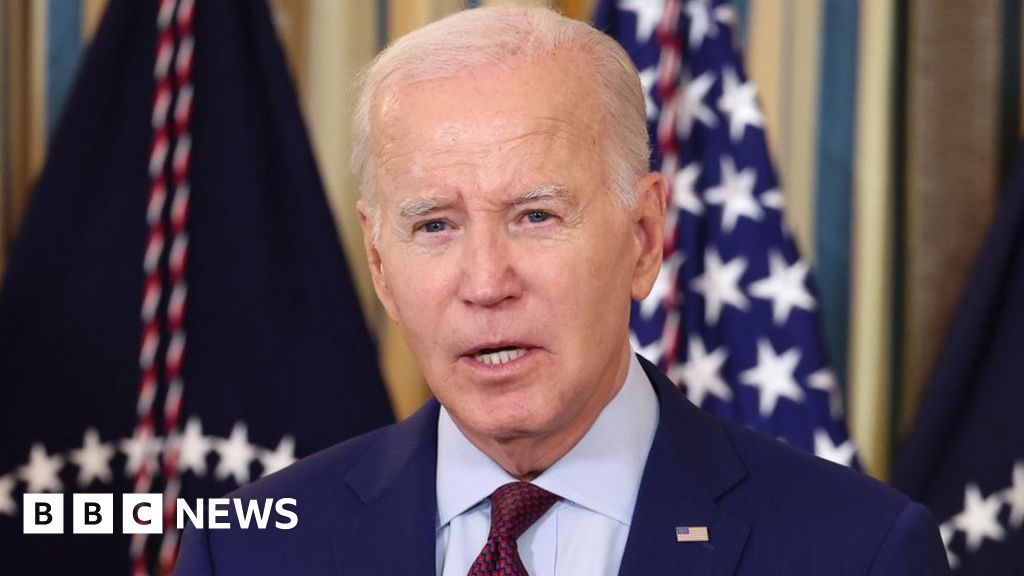TSMC: Chip Giant Delays Arizona Production In Blow To Biden

President Biden at TSMC's Arizona factory
Chipmaking giant Taiwan Semiconductor (TSMC) has delayed the start of production at its factory in the US state of Arizona, in a setback to President Biden's technology ambitions.
The firm says chip manufacturing will no longer start next year, due to a shortage of skilled workers.
The White House has laid out plans to bring more chip production to the US.
It comes as an ongoing trade row centred on the technology intensifies between Washington and Beijing.
TSMC's shares closed more than 3% lower in Taiwan on Friday.
On Thursday, TSMC Chairman Mark Liu said production of advanced microprocessors at its Arizona factory in the south west of the US would now begin in 2025.
During an earnings presentation, Mr Liu said the plant, which has been under construction since April 2021, faced a shortage of workers with the "specialised expertise required for equipment installation in a semiconductor-grade facility."
He added that the firm was "working to improve the situation, including sending experienced technicians from Taiwan to train the local skilled workers [in the US] for a short period of time".
TSMC also forecast a 10% drop in sales this year, because of slower demand for semiconductors.
The company said its profits fell by around 23% to 181.8bn Taiwanese dollars ($5.8bn; £4.5bn) in the three months to the end of June, compared to the same time last year.
TSMC first announced plans to build a facility in Arizona in 2020, during the presidency of Donald Trump.
In December last year, the firm said it would more than triple its investment in the project to $40bn (£31.1bn). This marked one of the largest foreign investments in American history.
Watch: In 2021, the BBC toured an Intel plant in Arizona
At that time, Mr Liu said the first of TSMC's two semiconductor production facilities at the Arizona plant would be operational by 2024, with the second coming online by 2026.
A long-running technology dispute has seen the US impose a series of measures against China's chipmaking industry, while investing billions of dollars to boost America's semiconductor industry.
The US produces around 10% of the global supply of computer chips, which are key to everything from cars to mobile phones. In 1990 the country accounted for almost 40% of global production.
Last year, President Biden signed legislation committing $280bn to high tech manufacturing and scientific research in the US.
The investment included tax breaks for companies that built computer chip manufacturing plants in the country.
From Chip War To Cloud War: The Next Frontier In Global Tech Competition
The global chip war, characterized by intense competition among nations and corporations for supremacy in semiconductor ... Read more
The High Stakes Of Tech Regulation: Security Risks And Market Dynamics
The influence of tech giants in the global economy continues to grow, raising crucial questions about how to balance sec... Read more
The Tyranny Of Instagram Interiors: Why It's Time To Break Free From Algorithm-Driven Aesthetics
Instagram has become a dominant force in shaping interior design trends, offering a seemingly endless stream of inspirat... Read more
The Data Crunch In AI: Strategies For Sustainability
Exploring solutions to the imminent exhaustion of internet data for AI training.As the artificial intelligence (AI) indu... Read more
Google Abandons Four-Year Effort To Remove Cookies From Chrome Browser
After four years of dedicated effort, Google has decided to abandon its plan to remove third-party cookies from its Chro... Read more
LinkedIn Embraces AI And Gamification To Drive User Engagement And Revenue
In an effort to tackle slowing revenue growth and enhance user engagement, LinkedIn is turning to artificial intelligenc... Read more

